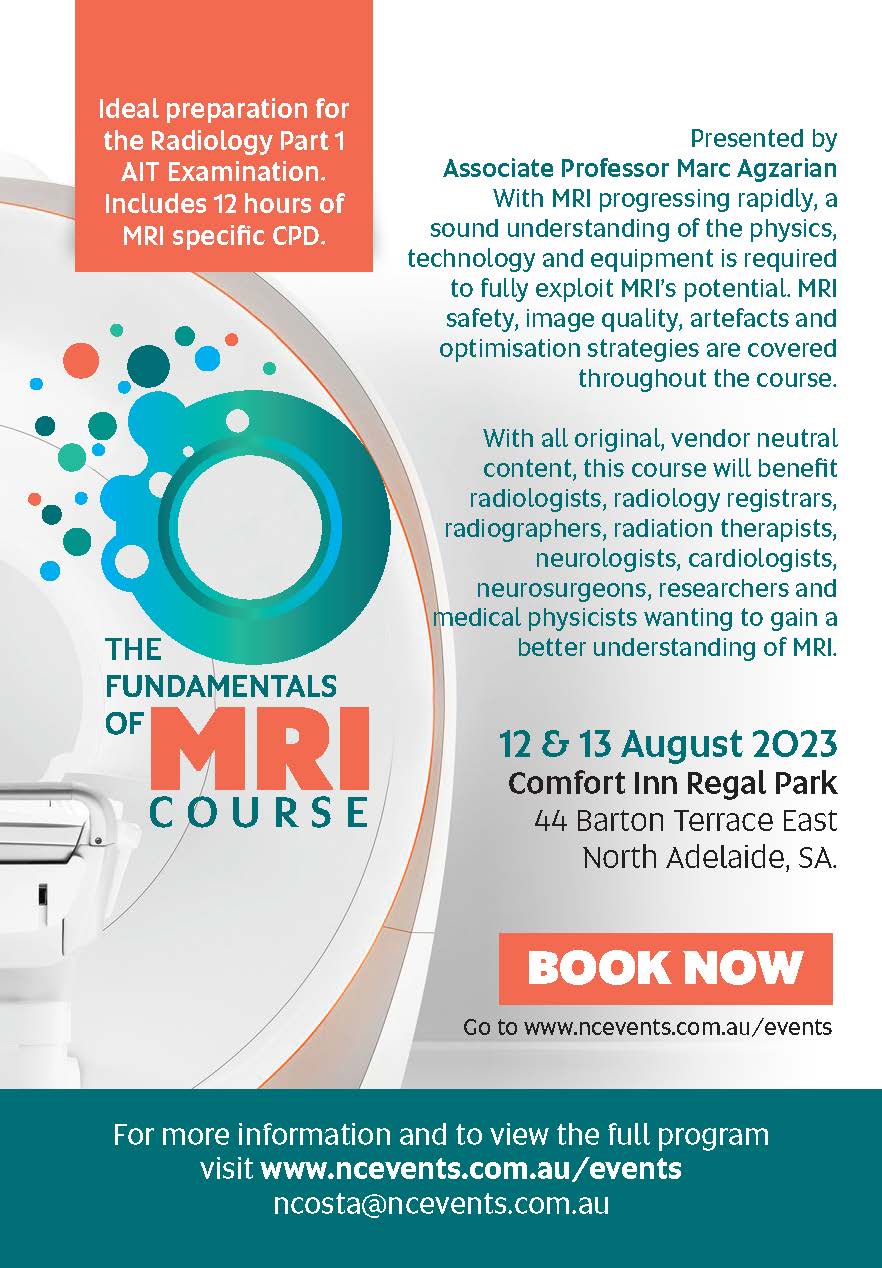
5 minute read
IAEA, the International Radiation Oncology Societies Network (IRON) and RANZCR
by RANZCR
The fundamental work of our College is the administration of our training programs and accreditation standards in clinical radiology and radiation oncology. Integrated into these is the program of continuing medical education. As members of the College we work through advocacy, quality and standards and research activities to promote the respective professions. Central to all of this is the focus on the best outcomes for our patients.
Some of our work extends beyond Australia, New Zealand and Singapore. We have long and continuing developing relationships with our neighbouring countries. One way our College provides assistance and extension of our professional expertise is via the International Development Fund (bit.ly/IDFund).
In radiation oncology, the Asia-Pacific Radiation Oncology Special Interest Group (APROSIG) has specifically supported radiation oncology professionals in Low- and Middle-Income Countries (LMICs) in the Asia-Pacific region. Via extensions of these activities, the Faculty of Radiation Oncology has been involved in a number of IAEA sponsored technical meetings on global cancer care, the first in 2020. The aim was to promote global collaboration of radiation oncology to improve access to radiation therapy.
This initial meeting had representatives from the American Society for Therapeutic Radiology and Oncology (ASTRO), the European Society for Therapeutic Radiology and Oncology (ESTRO), the Royal College of Radiologists (RCR), the Federation of Asian Organizations for Radiation Oncology (FARO), the African Organisation for Research & Training in Cancer (AORTIC), the Association of Latin American Therapeutic Radiation Oncology (ALATRO), the African Radiation Oncology Group (AFROG) and the IAEA (as meeting host).
In support of this initiative, the Faculty of Radiation Oncology Council approved continued participation in December 2021.
In June 2022, IRON was formed with the above organisations. It is of note that membership of IRON is via a society or college, not as individuals. And, with time other societies and colleges are expected to participate in the network. The mission states “…IRON… will…serve as a vehicle for sharing of information allowing closer connections between professional societies in the field, for the best patient outcomes and for the betterment of radiation oncology.”
The Chair and secretariat of IRON will rotate on an annual basis with the inaugural Chair being ESTRO and the second year will be undertaken by ASTRO.
During 2022, the College’s Board discussed this matter and approved our ongoing participation in IRON as well as being a signatory (via IRON and its 11 individual organisations) with IAEA on cooperation in the area of radiation oncology, imaging and medical physics. This was formalised in December 2022 at the IAEA, Vienna, Austria.
The 11 organisations involved are AORTIC, the American Association of Physicists in Medicine (AAPM), ASTRO, ALATRO, the Arab Medical Association Against Cancer (AMAAC), the Canadian Association of Radiation Oncology (CARO), ESTRO, FARO, the International Cancer Expert Corps (ICEC), RANZCR and the RCR. As Dean of FRO, I represented the College at this ceremony.
The founding of IRON and the formal recognition of cooperation with the IAEA allows the expansion of the sphere of influence the College has in radiation oncology beyond the Asia-Pacific region. Via APROSIG and FRO interactions, we have already provided support to countries like Cambodia, Papua New Guinea and Mongolia. Virtual tumour boards involve countries like Sri Lanka, Pakistan, Nepal, Indonesia and the Philippines.
In 2022, complimentary registration packages via APROSIG supported radiation oncologists from LMICs to attend the ASM in Adelaide. The good work of APROSIG has been led by its co-chairs A/Prof Mei Ling Yap (New South Wales) and Dr Iain Ward (Christchurch).
As another example of support for our neighbours, in 2020 and 2021, the FRO Council considered and approved a version of the radiation oncology curriculum to be used by the University of Papua New Guinea in its Clinical Oncology Curriculum.
Working with IRON and in cooperation with IAEA, FRO and the College will continue as well as expand its endeavours in the promotion of the profession of radiation oncology around our region as well as globally. Importantly, the practical arrangements with the IAEA include imaging and medical physicists. The College has great strength within the Faculty of Clinical Radiology to also be involved in the imaging activities as a joint Faculty approach.
As members of our College, many of us participate and volunteer our time in teaching and training. The opportunities available through IRON and the IAEA are even wider as our accredited training and education programs (both clinical radiology and radiation oncology) are highly regarded and recognised worldwide.
As with any thing “new”, there is much to develop, learn and to consolidate, especially as an organisation within a larger collaborative organisation. In due course, we will communicate further and seek members’ expressions of interest to help and guide our fellow clinicians in LMICs. In the meantime, do consider participation in existing opportunities in this arena via APROSIG and other College committees, working groups and special interest groups.
Dr Keen-Hun Tai, Immediate Past Dean, Faculty of Radiation Oncology











